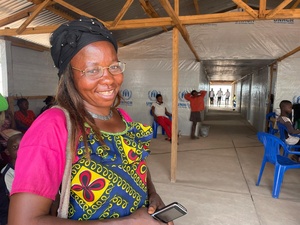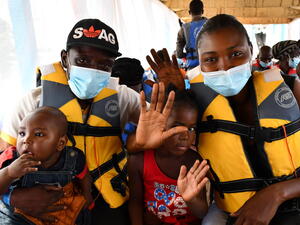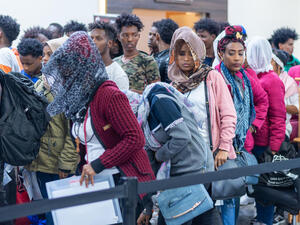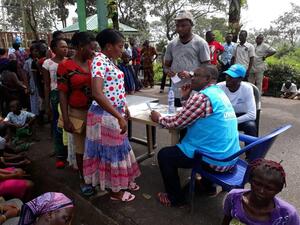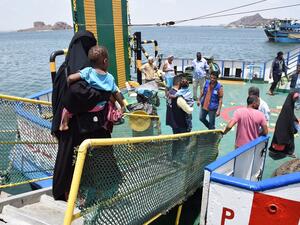UNHCR starts the year's Angolan returns from Zambia
UNHCR starts the year's Angolan returns from Zambia
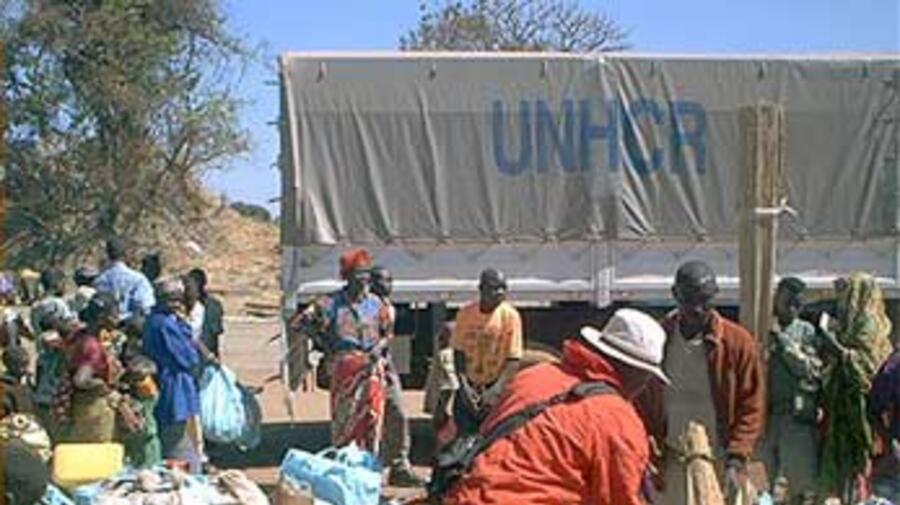
Angolan refugees packing up to leave Zambia's Meheba camp in 2003.
MEHEBA, Zambia, June 15 (UNHCR) - Hundreds of Angolan refugees headed home today in this year's first organised convoy from Zambia, an operation that could see 40,000 refugees returning to Angola by the end of October.
On Tuesday morning, 363 Angolan refugees left Meheba refugee settlement in western Zambia under UNHCR's voluntary repatriation programme. They sang and cheered at the send-off attended by representatives of the government, donor countries, UNHCR and its partner agencies.
"It is indeed gratifying that today, we are yet marking another milestone in our pursuit of durable solutions for refugees," said UNHCR's Regional Representative based in Zambia, Ahmed Gubartalla, referring to the resumption of the Angolan repatriation movement.
He thanked the government and people of Zambia for their long-term hospitality towards refugees: "In the true spirit of African generosity, Zambia kept the asylum door open for persons who genuinely needed protection. The people of Zambia must be proud to see that the refugees they hosted are now able to return to their country and become part and parcel of the force of reconstruction of a new Angola."
He added, however, "We have a heavy task before us, I will therefore urge all of us to continue with the excellent cooperation to ensure that ... we complete our task of repatriating all Angolan refugees in Zambia who wish to do so. UNHCR will ensure that we work strenuously to guarantee that there are steady, expeditious and regular repatriation convoys to Angola in accordance with set international standards of dignity and safety."
The returning refugees will travel 280 km before spending the night in Kamapanda near the Zambia-Angola border. They are expected to cross back into Angola on Wednesday, after which they will spend a few days at a reception centre in Cazombo in the east. There, they will receive training on mine awareness and HIV/AIDS prevention. They will also be given relief items like blankets, jerry cans, kitchen sets, agricultural seeds and tools, as well as a two-month supply of food from the World Food Programme.
More refugees are expected to follow on weekly convoys from Zambia, with returns starting from Mayukwayukwa and Ukwimi camps in July, and Nangweshi camp thereafter. UNHCR plans to help a total of 40,000 Angolan refugees to go home before the start of the rainy season at the end of October.
Currently, the Meheba-Cazombo route is the only accessible land route between the two countries due to poor roads, broken bridges and landmines. To access other parts of Angola, various possibilities are being discussed with the government and the International Organization for Migration, including road rehabilitation and airlifts.
To prepare for this year's returns, UNHCR has already improved the road to Cazombo - which was in bad condition after the rainy season - and rehabilitated way stations to make the journey more comfortable for the returnees. But much more needs to be done to make other parts of the war-torn country safe for return after 27 years of civil conflict.
A separate repatriation programme, which started in May, is currently underway from Namibia to Angola. In all, UNHCR expects 145,000 Angolan refugees to return home this year, 90,000 of them with the agency's assistance.
UNHCR estimates that there are some 223,000 Angolan refugees in major asylum countries in the region, including the Democratic Republic of the Congo, Zambia, Namibia, the Republic of Congo, South Africa and Botswana.


